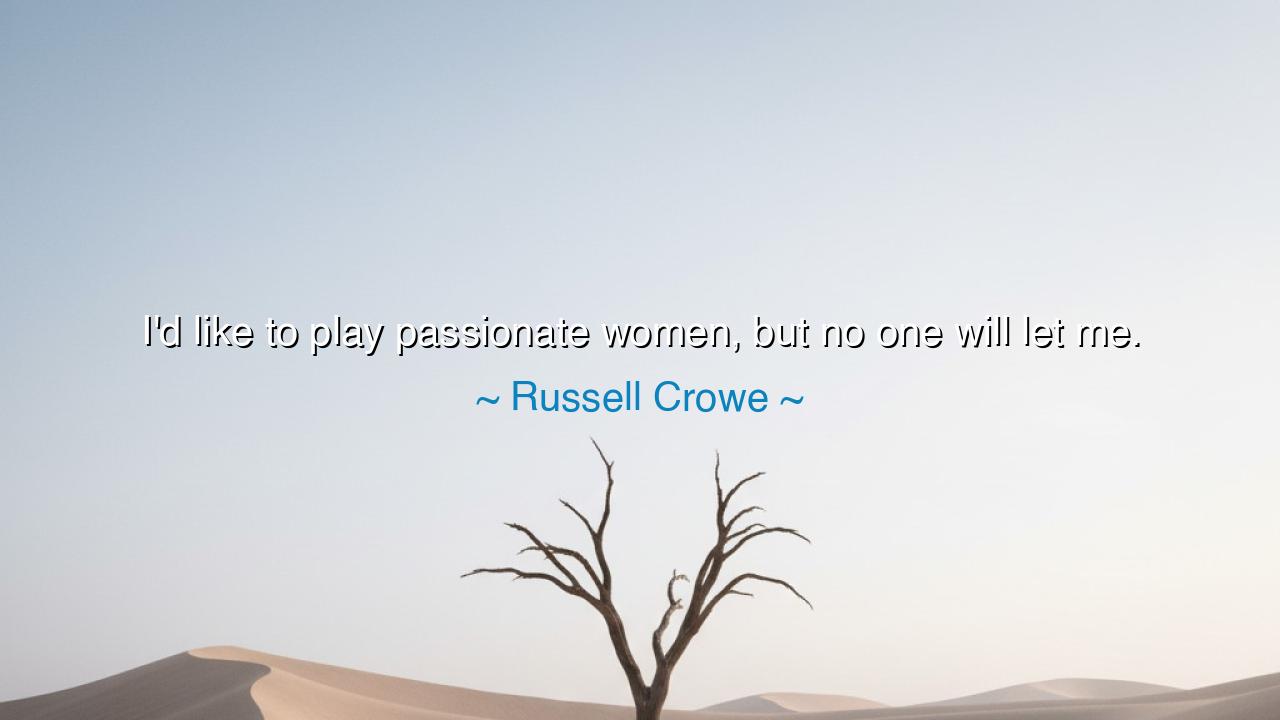
I'd like to play passionate women, but no one will let me.






The words of Russell Crowe, spoken half in jest and half in longing, conceal within them a truth about the nature of art: “I’d like to play passionate women, but no one will let me.” Here he acknowledges the boundaries of role and expectation, the invisible walls that govern who may embody which stories. His words, though humorous, also mourn the restrictions placed on the actor’s craft—that the realm of imagination is bound not only by skill, but by the world’s rigid perceptions of gender.
The ancients, too, knew this paradox. In the theaters of Athens, no women were permitted upon the stage; it was men who wore the masks of queens, maidens, and goddesses. A man could weep as Medea, rage as Antigone, or seduce as Helen of Troy. Thus Crowe’s lament, though modern, recalls the ancient tradition where men indeed played women, and passion was not confined by the actor’s body but unleashed by the soul’s capacity to imagine.
His saying also reveals a deeper wisdom: that passion belongs to all humanity, not to one sex alone. To embody a passionate woman is not merely to mimic her form, but to step into the fire of her courage, her fury, her tenderness, her strength. Crowe’s playful desire points to a serious truth: that the walls of gender too often prevent us from seeing the universality of emotion, that the hunger for love, power, and expression is common to all.
Consider the tale of Sarah Bernhardt, the great French actress of the nineteenth century, who defied convention by playing male roles such as Hamlet. She shattered the boundaries of her age, proving that art transcends gender, that what matters is not the actor’s body but their soul’s ability to capture truth. Crowe’s words carry the same longing—to explore roles forbidden by expectation, to prove that an actor’s gift is measured not by labels, but by depth.
Let the generations remember: theater and film are mirrors of humanity, and humanity is larger than the cages we create. Crowe’s jest is also a challenge—that perhaps one day passion will be seen not as “male” or “female,” but as simply human. For the actor’s calling is to embody the fullness of life, to walk in many skins, to reveal through art that all fire burns alike, whether it dwells in the breast of man or woman.






THHuynh Van Tuan Hung
This quote from Russell Crowe reflects an interesting point about the roles available for male actors. While passionate women characters are often complex and layered, male characters tend to be more reserved or aggressive in mainstream films. Why is there such a difference in how male and female passion is portrayed in film? Crowe’s comment makes me think about the need for more diverse and dynamic roles for men that explore the full range of human emotion.
TTThanh Ngan Tran T
Russell Crowe’s desire to play passionate women might be a reflection of his own emotional depth as an actor, which isn’t always showcased in typical male roles. I wonder if this statement is also a critique of the industry’s reluctance to cast men in roles that go beyond stoic, tough personas. Could Hollywood benefit from expanding the emotional spectrum of male characters and allowing actors like Crowe to explore different aspects of passion and vulnerability?
CPCuc Phung
It’s interesting that Russell Crowe wants to play passionate women, yet seems frustrated by not being allowed to do so. But what exactly does he mean by ‘passionate women’? Is he expressing a desire to portray a broader emotional range, or is this a commentary on gender roles in acting? Could it also be that Crowe is calling attention to the limitations imposed on men in terms of emotional vulnerability in film? I’d love to see a film where this could happen.
HAHoang Ha Anh
Russell Crowe’s frustration is understandable, but it also makes me think about how the entertainment industry tends to typecast actors based on their previous roles. Crowe is known for playing strong, heroic characters, so is it that directors simply don’t envision him as a ‘passionate woman’? Does this mean that men, just like women, are limited by the expectations that come with their on-screen persona? I wonder how much freedom they have to explore different dimensions of their craft.
BHBaodz Hehe
This quote from Russell Crowe raises some interesting points about the type of roles men are given in Hollywood. Passionate roles often carry an emotional depth that might not always align with traditional masculine portrayals. Could this reflect an expectation in the industry that men should be stoic or less openly emotional? I wonder if the industry is ready to break away from this stereotype and offer more complex, passionate characters to male actors.